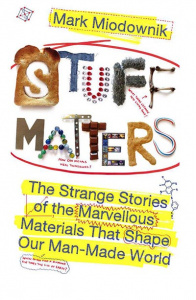Stuff Matters
 By Mark Miodownik
By Mark Miodownik
Review by Bex (Medicine)
I picked up this book by chance; it was in the new releases section of my local bookshop. Though maybe it’s a slightly unorthodox book to read when applying for medicine, I was immediately drawn to it because of how it explains the material science behind everyday materials – just as medicine studies how body systems sometimes stop working, and the effects of this on health.
The enthusiasm of the author is evident. He talks about a whole range of materials like glass, paper, steel and plastic – as well as chocolate, due to his love for it – and is enthusiastic about each one, no matter how mundane they seem. Each chapter focusses on a different material, and gives some real insight into how these work on an everyday basis, and why we have continued to use them for such a long time. He also brings in some newer materials like graphene – which matched up nicely with my chemistry A Level at the time.
Miodownik demonstrates the role of each material in development of new ones; for example, plastics may have begun with Bakelite, but their use expanded to nylon tights, and celluloid, which was key for film production (and films had a key role in culture especially over the 20th century). He delves into the history of ‘older’ materials, like porcelain, whose production began in China and spread slowly across the world; reflecting the sharing of knowledge through the world, and how industrial developments took place at different points in different countries’ histories.
This book is an account which makes you value everyday items, as well as teaching you to think about why things as they are, and what makes a substance successful. I really enjoyed it and I’m sure you might too!
Review by Tyra (Earth Sciences)
While I study Earth Sciences, reading Stuff Matters was an enjoyable and highly beneficial experience before beginning university, even though it has no direct relationship to my subject. It helped me to think about the world around me in a way that is essential for anyone studying physical sciences. The book encourages you to analyse familiar materials at an atomic level but also to take a step back and view the larger-scale interactions between materials and the wider world.
Each chapter involves discussing a different material, such as plastic or paper. The synthesis and the main uses of each material are clearly explained throughout, in a way that’s accessible to readers without technical knowledge of physics and chemistry that underpin how each material looks and behaves.
There are lots of photographs and diagrams for each material mentioned in the book, which lets you build up a real sense of the material’s scale. This lets you understand it inside out and recognise it day-to-day. Personal anecdotes from the author about each material are found in every chapter, which helps keep you engaged and also process the information better as it provides a break from the technicalities.
I would definitely recommend this book to anyone, regardless of prior knowledge about materials. I knew absolutely nothing about materials before reading Stuff Matters, and now I know lots of interesting facts about what I thought were otherwise mundane things that you see daily.
Stuff Matters by Mark Miodownik
ISBN-10: 0241955181
ISBN-13: 9780241955185
Try checking the availability of this book at your school or local library or explore second hand bookshops and websites. You may also wish to purchase from either Amazon or Blackwell’s.
